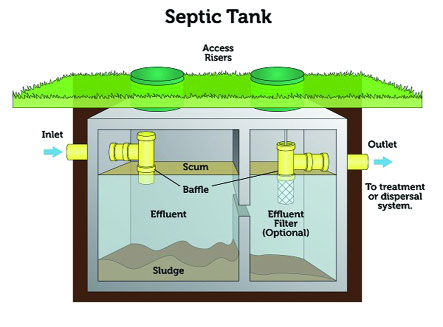We have to make efforts to ensure environmental cleanliness so that when we look around, we see and feel cleanliness in both visible and invisible things
There is a saying, “out of sight out of mind”, that means we forget about things we don’t see. It’s the same thing with sanitation and hygiene. As long as the filth or faeces is visible to our eyes, we are concerned about it, but as soon as it’s flushed, we stop thinking about what happened to it faeces, whether it was properly disposed of or covered up ostentatiously. It happens because either we are careless or we lack correct information.
Now take the example of septic tanks built in cities, how many of us know about the ‘sanitation value chain’? How many of us know how to make the correct septic tank, what is the right design and measurement? How many of us are aware that to keep the septic tank working smoothly and effectively, the septic tank should be cleaned every 3 to 5 years? How many of us know that due to the lack of regular cleaning of the septic tank, the sewage treatment process in the septic tank stops and untreated septage causes health problems? How many of us know that untreated septage from the septic tank goes into small and big rivers through drains and contaminates rivers?
All we know is that we flushed the toilets and the excreta was out of sight, now whether it has gone to the septic tank, went to the drain or river, what difference does it make to us? In many cities sewer treatment plants or faecal sludge treatment plants are in the process of being built, and in cities where they exist, they are insufficient. So, the question arises whether we are even aware of this issue, the environmental problems it causes, and if we want to understand and play a part in this.
Generally, in urban areas or even in villages nowadays, the septic tank is nothing but a container without any proper process or method for sewage treatment and it is safe in the long run. Local builders and contractors are also not concerned with how the structure should be. The owners understand it as a big-room like structure under the ground built as a septic tank for which they do not have to worry for 30-50 years.
Cleanliness cannot be achieved by making rules and regulations. We can definitely control it temporarily but ‘behaviour change’ is the solution. It should become a mass movement.
When talking about sanitation, there is a need to go beyond just the construction of toilets. Faecal Sludge Management has been called the missing and ignored component of the sanitation as safe management of faecal sludge requires more than just access to a toilet and use of a mere septic tank. Improving city-wide urban sanitation is complex as it must consider both on- and off-site systems, encompass the entire service chain, serve different customers and be acceptable to a broad range of stakeholders.
As much as it is the responsibility of the government and the government machinery, it is our responsibility also to understand the problem. The population is yet to be fully persuaded to change the age-old practice of defecating in the open, construct proper septic tanks, get into the habit of scheduled desludging and not neglect basic sanitation practices. We also have to be aware of the correct structure and design of the septic tank, in how many days it is necessary to empty the septic tank, who is the concerned authority to contact to get the septic tank emptied. We also have to monitor that solid waste from the septic tank is disposed of properly and not put in the drain or open ground. Single houses which do not have any drainage channels should have a soak-pit system unless the local panchayat or municipality makes some other concrete arrangement. Every effort has to be made to avoid waterlogging, whether through pit or by planting trees that absorb water or by applying other environmentally friendly methods.
We have to make efforts to ensure environmental cleanliness so that when we look around we see and feel cleanliness in both visible and invisible things.
(The writer is Programme Coordinator, WaterAid India. The views expressed are personal.)


























